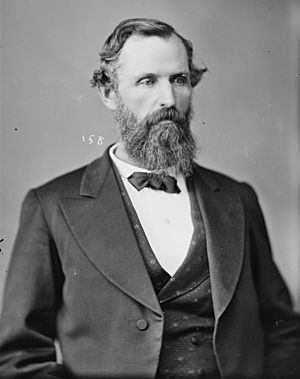Hiram Parks Bell facts for kids
Quick facts for kids
Hiram Parks Bell
|
|
|---|---|
 |
|
| Member of the U.S. House of Representatives from Georgia's 9th district |
|
| In office March 4, 1873 – March 3, 1875 (first term) March 13, 1877 – March 3, 1879 (second term) |
|
| Preceded by | New seat (first term) Benjamin Harvey Hill (second term) |
| Succeeded by | Benjamin Harvey Hill (first term) Emory Speer (second term) |
| Member of the Georgia Senate | |
| In office 1861 1900–1901 |
|
| Member of the Georgia House of Representatives | |
| In office 1898–1899 |
|
| Personal details | |
| Born | January 19, 1827 Jefferson, Georgia |
| Died | August 16, 1907 (aged 78) Atlanta, Georgia |
| Political party | Democratic |
| Profession | lawyer |
| Military service | |
| Allegiance | |
| Branch/service | |
| Years of service | 1861–1864 |
| Rank | |
| Commands | 43rd Georgia Infantry Regiment |
| Battles/wars | American Civil War |
Hiram Parks Bell (born January 19, 1827 – died August 16, 1907) was an important political figure from Georgia. He served as a U.S. Representative, which means he helped make laws for the country. He also served as a Confederate Representative during the American Civil War.
Contents
Early Life and Education
Hiram Parks Bell was born on January 19, 1827, near a town called Jefferson, Georgia. When he was younger, he worked as a school teacher for two years. After that, he decided to study law. He became a lawyer in 1849 and started his own practice in Cumming, Georgia.
Georgia and the Civil War
Hiram Bell was part of a special meeting in Georgia where leaders decided if the state should leave the United States. This was called the secession convention. He first voted against Georgia leaving, because he thought it was not a good idea. However, he later signed the document that declared Georgia's secession. He believed that people in the North were surprised the Southern states would leave. He also thought people in the South were surprised the government would try to keep the states together by force.
Bell also worked as a representative for Georgia. His job was to work with the state of Tennessee to help form a group of Southern states called the southern confederacy.
Military Service During the Civil War
In 1861, Bell served in the Georgia Senate. This is like a state-level law-making group. However, he left his job to join the Confederate States Army during the American Civil War. He started as a captain. Later, he was promoted to lieutenant colonel and then to colonel. He led the 43rd Georgia Infantry Regiment. From 1864 to 1865, Bell also represented Georgia in the Second Confederate Congress. This was the law-making body for the Confederate States.
After the War: Politics
After the Civil War ended, Hiram Bell continued his work in politics. From 1868 to 1871, he was a member of the Democratic State executive committee. This group helped guide the Democratic Party in Georgia.
He was elected as a Democratic Representative to the 43rd United States Congress. He represented Georgia's 9th congressional district. He served in this role from March 4, 1873, to March 3, 1875.
In 1876, Bell was a delegate at the Democratic National Convention. This is a big meeting where the Democratic Party chooses its candidate for president. He was also chosen to be a member of the Democratic National Committee from Georgia.
Bell was elected to the U.S. Congress again. This time, he represented the 10th district of Georgia. He filled a spot that became empty when Benjamin Harvey Hill resigned. Bell served from March 13, 1877, to March 3, 1879. He tried to get reelected in 1878 but did not win.
Later in his life, he continued to serve Georgia. He was a member of the Georgia House of Representatives in 1898 and 1899. He also served in the Georgia Senate again in 1900 and 1901.
Death
Hiram Parks Bell passed away in Atlanta, Georgia, on August 16, 1907. He was buried in the Cumming Cemetery.
Legacy
- Bell Street in Atlanta might be named after him.

